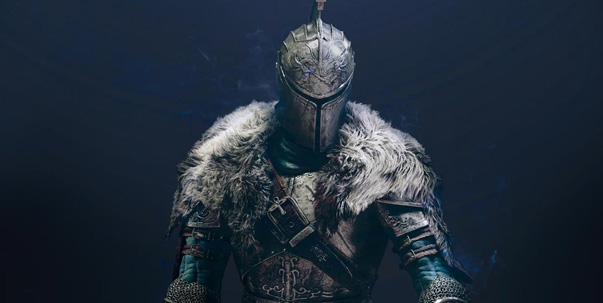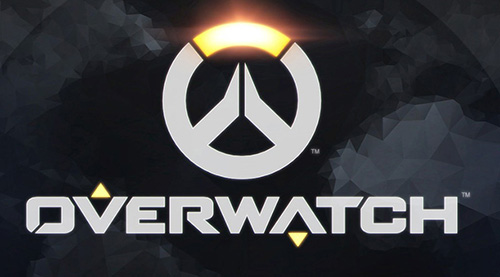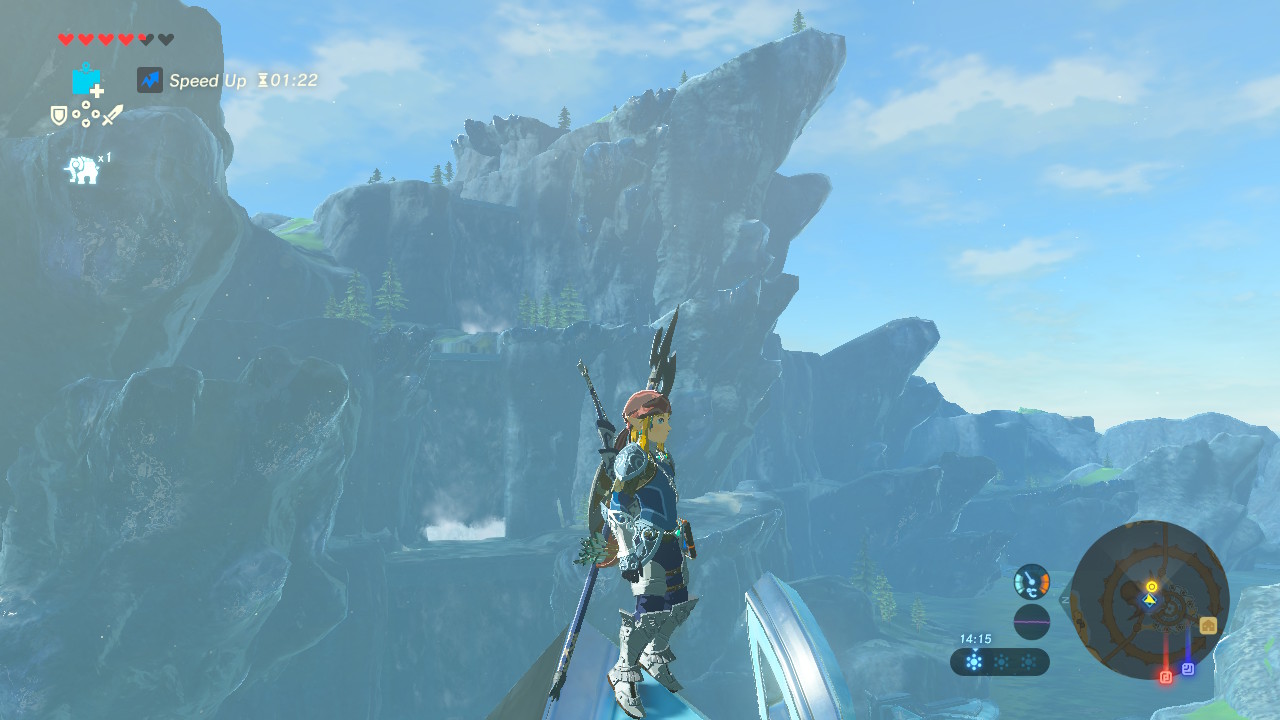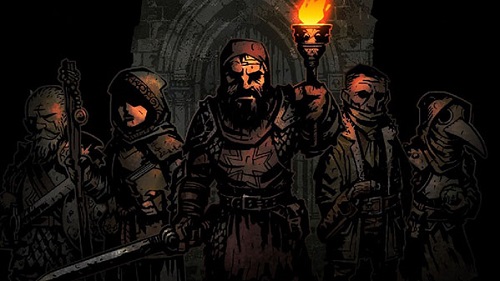
There appears to be a deepening divide in the video game industry between two differing developmental paradigms. On one hand, we have developers who aim to secure the ongoing attention and repeat custom of their players by means of constant reward, encouragement and validation (see Overwatch). On the other, there seems to be a small contingent of devs who strive to provide an experience that, while not quite as easy to swallow, has a lasting effect on their players (see Dark Souls III).
The ability to craft an enjoyable and rewarding game from what are, on paper, frustrating and unfair mechanics reveals a mastery of game design and a deep understanding of the psychology behind it. To be clear, I’m not saying one approach is better than the other. It is notable, however, that many of the most successful and critically acclaimed titles of the last few years have fallen into the latter category.
Joining this growing movement are Vancouver indie developers Red Hook Studios with their debut title, Darkest Dungeon. Blending Lovecraftian imagery with a gothic plotline and blackened tone, Red Hook have fashioned a game that not only delivers a solid RPG core with dungeon crawler mechanics, but goes a step deeper, ultimately asking more of it’s players than anything in recent memory.
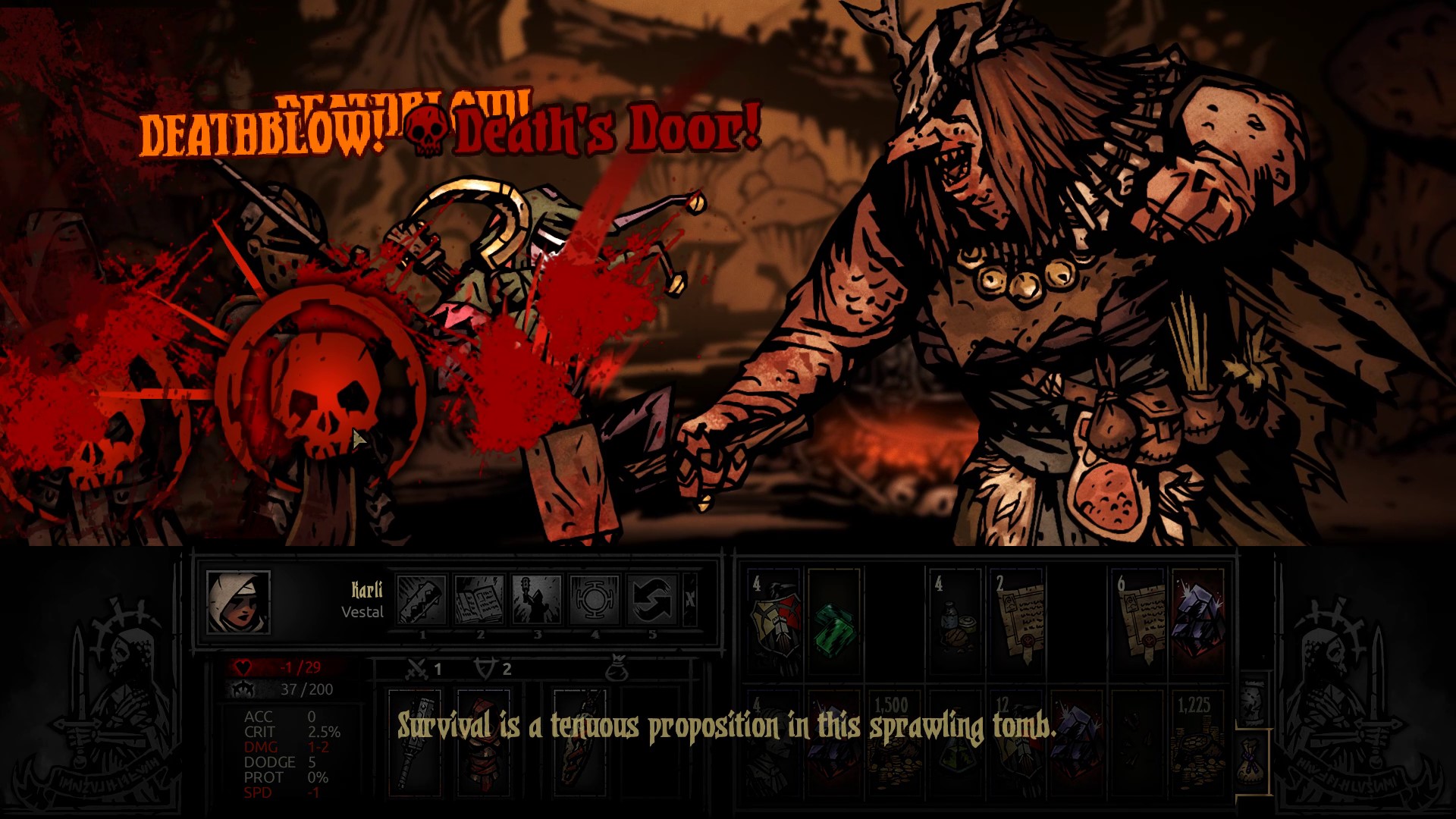
“How can one stand against all of this?” Posed in the dying breath of Reynauld the Crusader, the question spoke not only to the overwhelming power of The Hag that had just wiped my four strongest and best equipped heroes from the game, but also to the mounting dread that had crept up on me slowly and progressively as my time with Darkest Dungeon went on.
Characters had begged me, “Please don’t send me back! It’s suicide!”. In much the same way as the morale of my companions waned, my own desire to continue had been tested, as I led them again and again into situations that I knew were gradually less survivable.
I began to lean closer into the screen, closed my eyes and breathed deeply when the enemy landed a big strike, begged “Please don’t die” more than once, and rolled back in the chair with relief, hand on forehead, whenever we got lucky. I came out the other side of combat thanks to unexpected critical strikes on a few occasions, and caught myself thinking “Oh man, we didn’t deserve to survive that one.”
This is the meta-experience of Darkest Dungeon. It occupies your conscious mind so that it can creep into your emotions undetected and deliver a visceral anxiety more directly than any game I’ve experienced. Think of it, for easy comparison, as the Dark Souls of side-scrolling RPGs. Only, even Dark Souls lets you feel like you’re improving. Red Hook have no sympathy for you. I’m convinced they want you to quit.

At it’s core, Darkest Dungeon is a rogue-like RPG that does a fantastic job of balancing rewarding exploration and staggeringly difficult combat with some very light base building and upgrading mechanics.
Home ground ‘The Hamlet’ and it’s various buildings don’t demand too much of your time with filler gameplay. They exist only to serve the dungeon experience by allowing you to upgrade your heroes’ equipment and abilities, relieve them of their amassed stress and psychoses developed on missions, and to hire replacements when they die.
As the campaign rolls onward, you will grow to like and dislike certain heroes. It’s satisfying to dismiss a character who had a bad run of accuracy last mission, cost the life of a team mate, or perhaps came out with an illness that will affect future performances. In the same way, a hero that lands a clutch critical and saves the day will become your favourite, and you will sacrifice both mission success and other lives to protect them.
Fights are decided in many ways, based on the characters with which you construct your team. Some will stand toe to toe and engage in melee combat, while others will hang back and apply negative effects to enemies such as Bleed, Stun and Blight (poison). Less common are the classes capable of healing or team buffs, but their existence allows for added depth in assembling a solution to Darkest Dungeon’s many combat scenarios, all of which will be weighted heavily against the unprepared or careless.
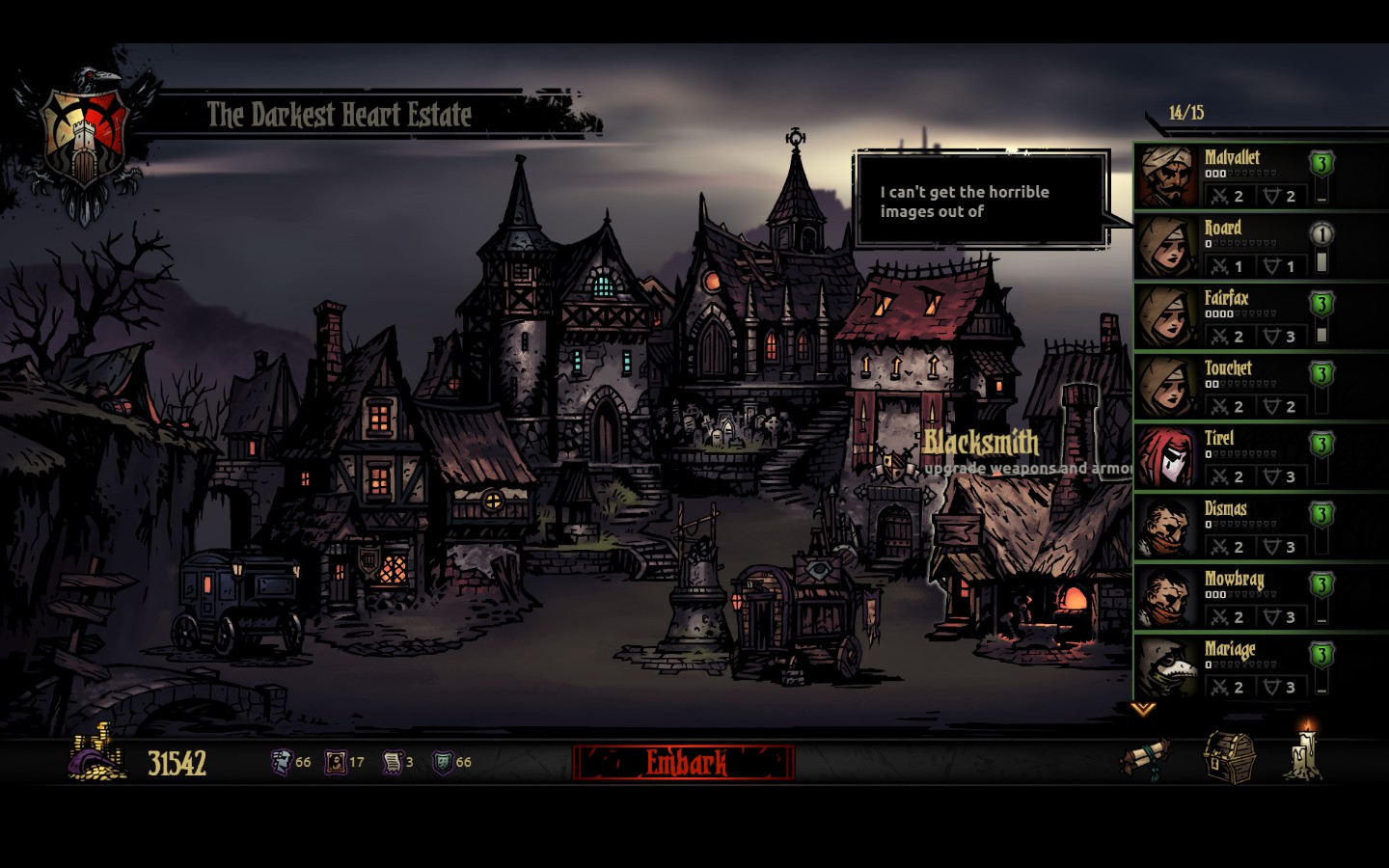
The dungeoneering is made more complex by the need to manage your supplies and resources while exploring. Your heroes will require rations, torches and medical supplies to survive. Take too much, and there will be no room to carry home the spoils of your adventure, leaving you underfunded when trying to upgrade characters for later challenges. Take too little, and your companions will die, one by one, in the dark.
Non-linear dungeons create choice and risk. Will you skip the side passageway to preserve precious resources? What if the quest item is down there, and we have to backtrack later with no torches or food left? One wrong call could cost you hours of work in levelling and upgrading heroes. This is the nail-biting degree of risk management that Darkest Dungeon asks of you.
Once you reach the mid to late section of the campaign, things slow down a little bit as the tide of new enemies, mechanics and challenges trickles to a halt, resulting in somewhat of a plateau in difficulty that is only overcome by weighting situations further and further against you numerically. Enemies simply gain more health and attack power, higher chances to land a critical strike or resist a status effect. This artificial ‘difficulty’ is common in many RPGs, but when compared with the complex strategic challenges presented in the early stages of Darkest Dungeon, it feels a little… cheap. This is my one criticism of the game.
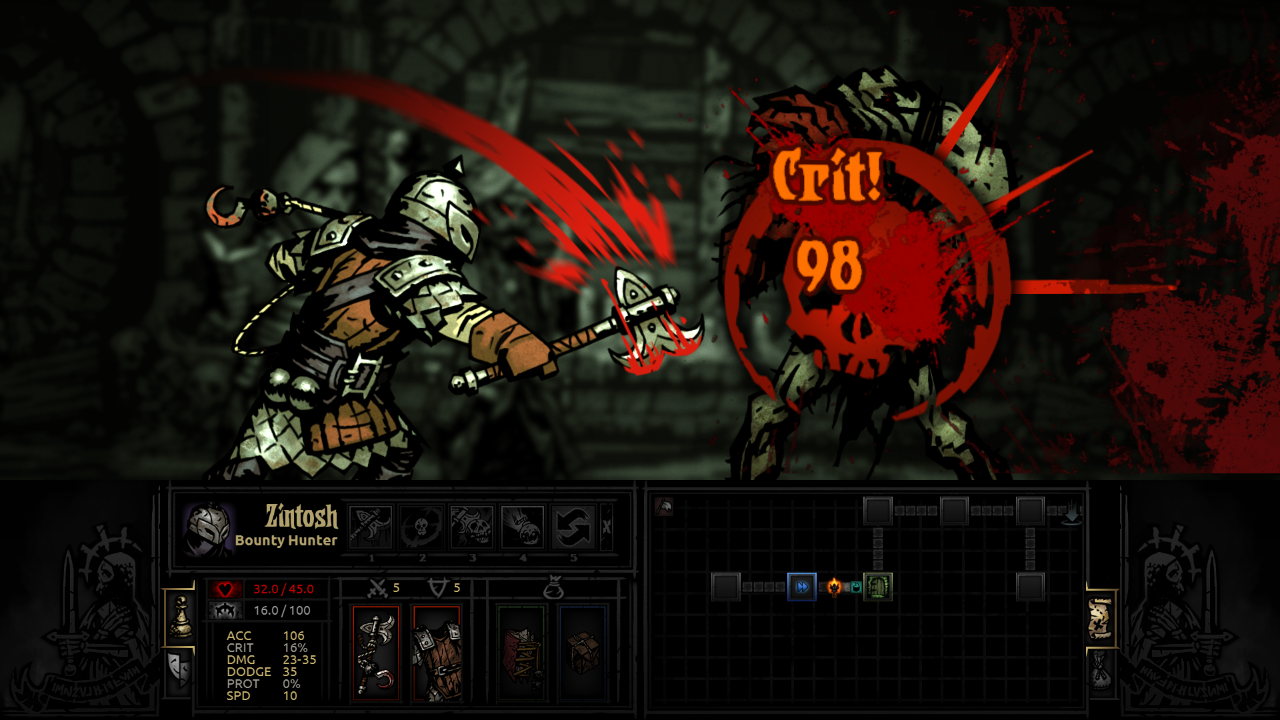
Darkest Dungeon is a masterpiece of ambience, tension, punishment and elation. Fundamentally well designed gameplay mechanics serve as the backbone of the experience, but the real magic of the title comes in it’s ability to get inside your head and poke at your inner workings. You will be tested from the very first moments of gameplay, and you will fail frequently. With the impending release of the Crimson Courtyard DLC, and the availability of some outstanding user created mods, it’s a great time to try out Darkest Dungeon for yourself. Just don’t give up.
- Classic dungeon crawler experience
- Passionately crafted art, soundtrack and voice acting
- Deeply challenging and rewarding
- Difficulty gets a little cheap towards the end.



